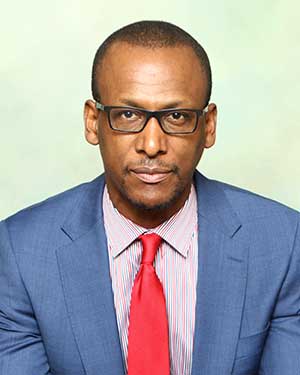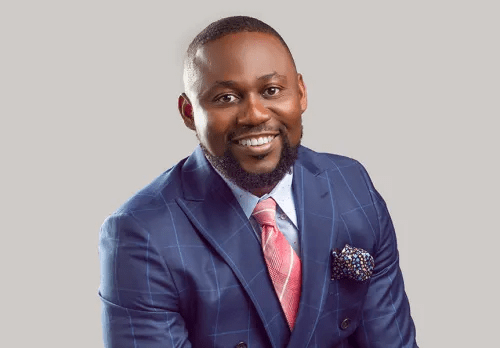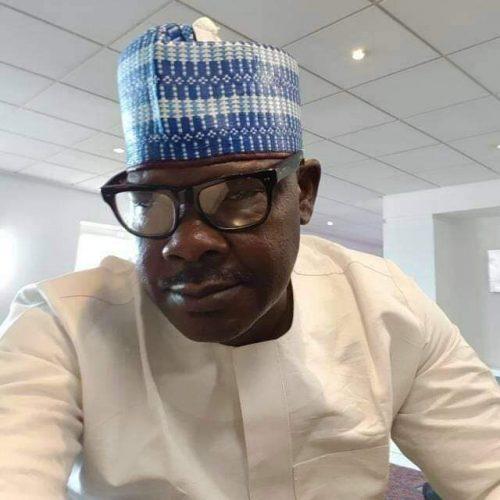He recently joined the League of the accomplished who have put Nigeria on the global map. Kene Ilochonwu became the first Black Bencher at the Law Society of Alberta Province in Canada after 113 years. The legal counsel with Parkland Corporation tells Funke Olaode his moment, luck, and being in the right place

His athletic figure and height cut the image of an Olympic champion. He may look unassuming and straightforward, but the Nnewi Anambra-born lawyer is an extraordinary Nigerian who has made giant strides in Canada. Kene Ilochonwu made a global headline late last year when he attained a feat never achieved by any black man. The legal counsel with Parkland Corporation broke 113 years jinx by becoming the first Black Bencher at the Law Society of Alberta Province in Canada. He was sworn in on February 25, 2021. Excited and grateful, but before this defining moment, there was a beginning, which kicked off at age six in Lagos.
He said, “I grew up in Nigeria; I was born in Onitsha and moved to Lagos when I was six years old. I attended high school at Federal Government College Ogbomosho. I come from humble beginnings. I do not take anything in life as it is on merit; a lot of times it is luck, being at the right place at the right time, or just meeting the right people to help you. My dad was an industrialist and businessman, but I wasn’t cut out for that. I was more interested in attending school and gaining higher education, which is why I went to live with my uncle in Lagos at six years old.”
Advertisement

To order your copy, send a WhatsApp message to +1 317 665 2180
He added, “My uncle trained me from when I was six until when I left the country. My uncle had returned to Nigeria from Zambia with his family, and he had told my parents that he could take me with him to Lagos because he had a son who was two months younger than me. I then became a second son to him, and he trained me from the time I was six up to my Master’s degree, which he paid for. And that was part of the luck I had as well. So I didn’t have a scholarship or anything. I was lucky my uncle was there for me and did everything.”
Becoming a global icon wasn’t part of his life trajectory or planned out. It is just by accident. He explained: “I have lived in three worlds; Nigeria, Scotland, and Canada. It was by accident, totally by accident. Moving to Scotland was when MTN and Econet came out here in Nigeria. And being a lawyer, I said it would be good to do telecoms law so that I will work in MTN or Econet. So there were only two universities that offered communications law, the University of Strathclyde in Scotland and the Queen Mary University of London. Queen Mary University was about £10,000, while Strathclyde was £7,700. So I said I would go for the cheaper option so that I could convince my uncle to pay for the tuition fees.
“So while I was in Strathclyde, I had travelled to Canada on a visit to a friend, Ako Ufodike. During the visit, he asked me about exploring moving to Canada. This was in 2003 or 2004. The Canadian economy was expanding. The Canadian government had a good and proactive immigration system. Getting a permanent residency in the UK would have taken me like seven years, but applying for permanent residency in Canada was a more straightforward and shorter route. So I said, why stay in the UK and struggle for permanent residency, struggle for citizenship when I can go to Canada. In 2004, I applied for my permanent residency in Canada and received it in 2006. So again, it wasn’t a trajectory I planned. It just happened that I visited my good friend Ako, he encouraged me to apply, and I applied and got it, and I moved. Interestingly, my friend Ako lived in Toronto, but my wife at the time lived in Calgary (which is like the oil capital of Canada). So I went to Calgary. Two months later, I got a job in the oil-producing area (called Fort McMurray), which is like the Port Harcourt of Canada.
“If I was living in Toronto, I wouldn’t have applied for the job because Fort McMurray is like a 5 hours flight from Toronto. But because I was living in Calgary, which is just a one-hour flight from Fort McMurray, I got the job, and that was what saved me. I didn’t have to practice law because I was doing supply chain, and it set me up well. I got a house within four months of coming to Canada. Because the company I worked for really encouraged us to settle in the city and build houses. So I was so lucky,” he explained his life in Canada, which later paid off.
But has Kene been a gifted child? “Not really,” he responded.
“I am just determined because when I came to Lagos as a six-year-old, I really missed my parents. But remembering the fact that I moved to Lagos because I was bright, I was determined to prove them right. In order not to disappoint my parents and my uncle, who nurtured me to be educated, I was determined to succeed. Then when I did my common entrance, obviously, I didn’t do primary six like most children. My cousin had passed from primary five, so seeing somebody ahead of you, you are challenged to keep pushing because my cousins were geniuses. When I finished secondary school, I didn’t get into university immediately. Then I sat JAMB again while I was already in IMT Enugu studying business administration. This time I got an admission to study law at Abita State University. But I was enjoying business admin, so I didn’t want to go. My uncle worked in Savannah Bank back in the day, and his colleague, a branch manager in Enugu, encouraged me to pursue a degree in law. I yielded to his advice and moved to Abia State University and registered. I was the second to the last person to register before matriculation. I think I registered on Tuesday, and the matriculation was on Friday. I would have missed it. When I started studying law, I loved it. And that determination to do well helped me. My family was in Lagos and Onitsha, and I was in Abia State. I had never been to the East before. Since leaving Onitsha and moving to Lagos when I was six years old, I have not been back to the East except for school vacations, and having lived in Lagos and the West, most of my life, when I moved to Abia State to study, I couldn’t really speak Igbo. I had to learn to speak Igbo at Abia State University.”
He found himself in the law field accidentally or by persuasion, but he really wanted to be a farmer.
“Interestingly, when I was in JSS, I wanted to be a farmer because I like the soil. I had a school guardian when I was in Secondary, and he had a farm. I actually wanted to study agriculture, but I am not into the sciences. To study agriculture, you had to do chemistry, biology, and all that. But I was good at history. I was good at English, literature, so that was the part for me to go. What I was good at determined what I studied.”
His career path was defined in Canada, the land of his dream. How did he do it?
“In Canada, you first do exams called the National Committee on Accreditation. So all internationally-trained lawyers had to do those exams to be equivalent of a Canadian law graduate. It is like doing some university courses to be an equivalent of a law graduate. I was called to the bar already, but I still had to do it. I passed the exams in 2012. After passing the exams, you need to do what they call articling, which is like law school. It is a one-year traineeship or internship. But I was already doing so well in my supply chain field, and I didn’t think I needed to do the articling. I was already earning six figures, so why would I go back and start all over again as a junior lawyer and start earning five figures? I wasn’t humble. I wasn’t determined enough, I practised the supply chain, and I did very well.”
While exploring the corporate world of making money, it was later short-lived. Recalling that defining moment in his life, he stated, “I got fired from my job in 2015. So I didn’t have my six-figure income anymore. So I then started networking with a few lawyers, and that determination came back again. A lot of people find it hard to get articling. If I hadn’t been laid off, I wouldn’t have gone back to law, and if I hadn’t gone back to law, I wouldn’t have been here today. So that adage they say, what the enemy meant for evil, God turned for good is very true. I have a lot of mentees, and I tell them, do not look at your current situation. Sometime in the future, you are going to look back and say wow, and thank God I was in that situation. It is good to have obstacles because when you have obstacles, and you excel, you will look back and say, God took me through that. But when people excel without obstacles, they get arrogant. You have an ego. You think it is through your own efforts that you did it. You don’t realise that a greater force put you through that.
So I got laid off in 2015. I met with a few lawyers. I met one of my mentors. Her name is Lara Pella. She mentored me, and I went into a programme for internationally trained lawyers. I did my articling in a law firm called DLA Piper, which is an international law firm and also at Imperial Oil which is the Canadian arm of Exon Mobil. I finished my articles. And Lara again mentored me. I got to work in a law firm, one of the biggest law firms in Canada, Blake, Cassels & Graydon. I was in Blakes for a year, then went in-house. Because of my supply chain experience, I loved business, the business of companies. I tend to like business law, so I went into my current role, which is Parkland Corporation, which is a downstream oil and gas company until I ran for bencher position.”
At what time did he run for the Bencher position, and what influenced that?
“Well, a lot of people thought it would be a good thing for me to run because of what I had been doing in the community, what I have been doing in the legal profession, etc. So I ran for the election, and I was lucky enough again and the determination, apart from the fact that I am the first black person, I am also the most junior. In Canada, I am only three years call. People who are three years call are still learning the ropes. So, I am sure I am the most junior bencher ever to be elected. Because most of these benchers, you need to be elected, you need to be known by your colleagues. Usually, you are like 10, 15, 20 years at the bar for people to know you and vote for you. It was a huge leap for me, and it paid off.
How did he feel about becoming the first black man in the history of the Law Society in the province of Alberta? “Interestingly, I didn’t know I have broken the jinx, but then when I heard I was the first black bencher, I looked around and said I don’t know if I am ready for this popularity. I am just a simple guy that just wants to go out and help people. Go and promote internationally trained lawyers, promote visible minorities. So it was bittersweet for me. It was good, the popularity was there, it was good, and I made history. But I don’t want you to take away from the task at hand. It is important to understand that there is a lot of work to be done. After all the noise about being the first black bencher, if I go there and I don’t do a good job, what will be the point of being the first black bencher. Obama being the first black president, needed to leave a legacy. In Alberta, we have the first black Minister of Justice in the whole of Canada, Kelechi Madu. He is doing a good stuff job. I met with him, and he also encouraged me. So the point is to go there and do a good job. So really, I can’t wait for all these things happening in the world to die down so I can get to work.”
Blessed with two boys, Kene, a fan of Chelsea Football Club’s passion also lies in mentoring people, particularly internationally-trained lawyers.
“I like to be a mentor because people helped me get to where I am. I would say I was lucky, and I want to be the luck for some other person to help them get to where they want to go,” he stated.
Source: This Day


















